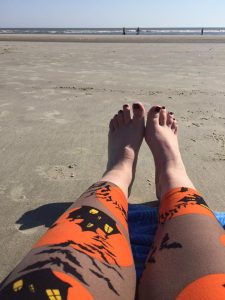This article is more than 5 years old.
For the third year in a row, early November found me enjoying several days in Charleston, SC, while attending the Charleston Conference. This year, however, my conference travel was extended, as I also attended the inaugural meeting of the Cambridge University Press North American Advisory Board prior to the Charleston Conference, so I had six days to enjoy the gorgeous fall weather at the coast…and by fall, I mean mid-80s temps that felt more like July than November!
The CUP board meeting was a day-long event on Tuesday, November 1, and while I cannot share specifics of all we discussed, I can share that I was encouraged by the day’s discourse. I felt free to share my perspectives on the challenges and changes in scholarly publishing, particularly as I see them from an intellectual property standpoint, and I felt that our discussions were open and the librarians’ contributions were well-received by the CUP staff. I look forward to serving on this advisory board.

The Charleston Conference proper kicked off on Wednesday with the Vendor Showcase, during which I touched base with a couple of vendors/publishers I knew, collected some information from others, and had pleasant conversations with several reps. The heart of the conference, though, happens Thursday through Saturday, and while I didn’t learn anything earth-shattering, I was encouraged to hear that some of the issues I’ve been discussing in my scholcomm circles for awhile now are also making their way into broader conversations across librarianship:
- Instead of collecting what our users need, perhaps we need to shift to collect what our scholars produce, building a network of local repositories whereby all the world’s knowledge would be captured; copyright reform is critical to achieve this vision. (Plenary: You Can’t Preserve What You Don’t Have–Or Can You? Libraries as Infrastructure for Perpetual Access to Intellectual Output; Anja Smit, University Librarian, Utrecht University)
- Build community around your content: cultivate the connections between your content and the larger information ecosystem (Concurrent: The Right Stuff a the Right Cost and for the Right Reasons)
- “Invest in yourself first” retirement investment strategy should also apply to library collections (Concurrent: The Right Stuff a the Right Cost and for the Right Reasons)
- Libraries claim to be open access supporters, but we do a poor job promoting open access resources to our patrons [YEP!] (Neapolitan: Access to Freely Available Journal Articles: Gold, Green and Rogue Open Access across the Disciplines)
- If we shift focus to USERS of OA content and make it easier for them, might in turn make them more willing to be PRODUCERS of OA content (Neapolitan: Access to Freely Available Journal Articles: Gold, Green and Rogue Open Access across the Disciplines)
- Even institutions engaged in Digital Humanities work for years now don’t have good sustainability plans (Lively Lunch: How to Play a More Active Role in Digital Humanities Research)
- Concept of “book” versus “journal” not as clear as some might think; all containers are somewhat artificial (Concurrent: Content as a Community Asset: What Happens When It Loses Its Traditional Container?)
- Publisher’s brand is a container, too [YES!!!] (Concurrent: Content as a Community Asset: What Happens When It Loses Its Traditional Container?)
- [This is why we need publishers to shift from products to services as the “containers” of scholarship change – MK observation]
- Text & data mining (TDM)=gift with purchase; TDM language starting to be included in licensing agreements (Concurrent: Walled Gardens and Digital Playgrounds: Who’s Playing in the World of Text and Data Mining?)
If anyone wants to chat about any of the above, let me know. Oh, and I do have restaurant recommendations to share, if needed, ‘cause Charleston=GOOD EATS!

4 Comments on ‘Molly at the 2016 Charleston Conference’
Molly, thanks for this post! Your bullet list gave me some things to think about! (like promoting our open access resources to our patrons!)
Great view of what was discussed at Charleston that related to scholcomm, Molly, and illuminating for those of us not already immersed in it!
It’s useful to see the affirmation of the work scholcomm folks have been doing. Thanks for the report.
Sustainability plans for Digital Humanities work is really concerning. Once these cool projects become just another in the morass of information that is in the information zeitgeist, how can it be uncovered? Who will do the ingesting? How will it be kept viable? Troubling questions.